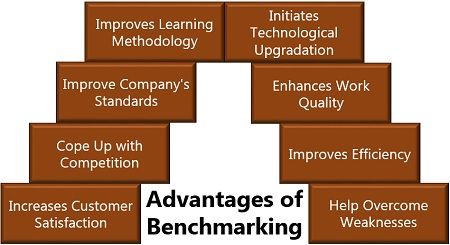Benefits of Benchmarking
Benchmarking is a strategic process that allows businesses to compare their performance against industry leaders and identify areas for improvement. By analyzing best practices and key performance indicators (KPIs), companies can gain valuable insights and make informed decisions to enhance their operations and achieve competitive advantage.
Enhanced Performance
One of the primary benefits of benchmarking is the opportunity to enhance overall performance. By benchmarking against top-performing companies, organizations can identify gaps in their processes, systems, and strategies. This analysis enables them to set realistic goals and implement necessary improvements to bridge those gaps.
Process Efficiency
Benchmarking helps businesses optimize their processes, leading to increased efficiency and productivity. By evaluating how industry leaders handle specific tasks or operations, organizations can identify bottlenecks, streamline workflows, and eliminate unnecessary steps. This can result in cost savings, reduced cycle times, and improved customer satisfaction.
Quality Improvement
Another significant benefit of benchmarking is the potential for quality improvement. By studying the practices of top performers, companies can identify best-in-class quality standards and implement them within their operations. This can lead to enhanced product or service quality, reduced defects, and increased customer loyalty.
Innovation and Creativity
Benchmarking encourages innovation and creativity within organizations. By examining how industry leaders approach product development, marketing strategies, or customer engagement, companies can generate fresh ideas and find new ways to differentiate themselves in the market. This can result in the development of innovative products, improved marketing campaigns, and enhanced customer experiences.
Strategic Decision Making
Benchmarking provides valuable insights for strategic decision-making. By analyzing the practices of successful companies, organizations can identify emerging trends, industry benchmarks, and potential opportunities. These insights enable businesses to make informed decisions, allocate resources effectively, and stay ahead of the competition.

Benchmarking offers numerous benefits for businesses, including enhanced performance, improved process efficiency, quality improvement, innovation, and strategic decision-making. By leveraging the insights gained from benchmarking, companies can optimize their operations, stay competitive, and achieve long-term success in their respective industries.
FAQs – Benefits of Benchmarking
1. Why should a company consider benchmarking?
Benchmarking allows companies to compare their performance against industry best practices and identify areas for improvement. It helps in setting realistic goals and improving overall performance.
2. How can benchmarking help in enhancing competitiveness?
By benchmarking, companies can identify their strengths and weaknesses relative to competitors. This knowledge enables them to make informed decisions and implement strategies to gain a competitive edge.
3. What are the potential cost-saving benefits of benchmarking?
Benchmarking helps in identifying inefficiencies and cost-saving opportunities. By learning from best practices, companies can streamline processes, reduce waste, and optimize resource allocation, leading to significant cost savings.
4. Can benchmarking improve customer satisfaction?
Absolutely! Benchmarking allows companies to analyze the customer satisfaction levels of industry leaders and compare them with their own. By implementing successful strategies, companies can enhance their customer service and satisfaction levels.
5. How does benchmarking contribute to innovation?
Benchmarking encourages companies to look beyond their industry and learn from other sectors. This cross-industry learning fosters innovation by introducing new ideas, processes, and technologies that can be adapted to improve products or services.
6. Does benchmarking help in improving decision-making?
Yes, benchmarking provides valuable insights into industry trends, best practices, and performance gaps. This information facilitates data-driven decision-making, enabling companies to make informed choices with higher chances of success.
7. Can benchmarking help in employee development?
By benchmarking against industry leaders, companies can identify skill gaps and areas for improvement in their workforce. This knowledge can be used to design targeted training and development programs, enhancing employee skills and performance.
8. How does benchmarking contribute to organizational learning?
Benchmarking promotes a culture of continuous learning and improvement within an organization. By studying and adopting best practices, companies can continuously enhance their processes, products, and services, fostering organizational growth.
9. What are the long-term benefits of benchmarking?
Long-term benefits of benchmarking include increased competitiveness, improved financial performance, enhanced customer satisfaction, better decision-making, and a culture of innovation and continuous improvement.
10. Are there any challenges in implementing benchmarking?
Yes, implementing benchmarking can be challenging due to issues like data availability, comparability, and confidentiality concerns. However, with proper planning and collaboration, these challenges can be overcome, and the benefits of benchmarking can be realized.




